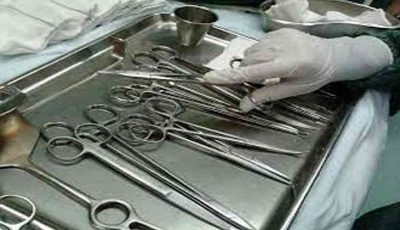- Home
- Editorial
- News
- Practice Guidelines
- Anesthesiology Guidelines
- Cancer Guidelines
- Cardiac Sciences Guidelines
- Critical Care Guidelines
- Dentistry Guidelines
- Dermatology Guidelines
- Diabetes and Endo Guidelines
- Diagnostics Guidelines
- ENT Guidelines
- Featured Practice Guidelines
- Gastroenterology Guidelines
- Geriatrics Guidelines
- Medicine Guidelines
- Nephrology Guidelines
- Neurosciences Guidelines
- Obs and Gynae Guidelines
- Ophthalmology Guidelines
- Orthopaedics Guidelines
- Paediatrics Guidelines
- Psychiatry Guidelines
- Pulmonology Guidelines
- Radiology Guidelines
- Surgery Guidelines
- Urology Guidelines
Are kidney stone surgeries putting patients at risk?

Washington D.C.: The techniques used to clean and sterilize flexible ureteroscopes leave behind contamination including debris, residue and bacteria, according to a new study.
The research, presented at the 44th Annual Conference of the Association for Professionals in Infection Control and Epidemiology (APIC), concluded that these failures may result in the use of dirty scopes.
"APIC is concerned that the techniques used in the field are insufficient, and that current methods in place are introducing more contamination with the reprocessing of each scope," said Linda Greene, APIC president. "The results of this study are concerning and should prompt hospitals to ensure that proper cleaning verification and visual inspections are being performed."
The study, conducted by Ofstead & Associates, Inc., is the latest of its kind to raise concerns about infections associated with endoscopic procedures, as outbreaks have been linked to contaminated duodenoscopes, gastroscopes, bronchoscopes, and cystoscopes.
Ureteroscopy is a common outpatient surgical procedure. Doctors insert a thin, flexible scope into a patient's urinary tract to look for and remove kidney stones. Most flexible ureteroscopes are reused following cleaning and high-level disinfection or sterilization.
"This study underscores the importance of consistently monitoring reprocessing outcomes to ensure ureteroscopes are sterile and safe for patient use," said lead study author Cori Ofstead. "Sterilization failures were unexpected and are deeply concerning."
Researchers sampled 16 ureteroscopes at two institutions after they were cleaned and sterilized with hydrogen peroxide gas. They detected contamination on 100 percent of the scopes. Every scope exceeded the benchmark for protein, hemoglobin was found on 63 percent, and 44 percent had higher adenosine triphosphate (ATP) levels than anticipated. Visual inspections identified debris protruding into channels, oily deposits, and white foamy residue, an abnormality that researchers had never seen.
Reprocessing failures have also been found in other endoscopes. There are currently no reprocessing standards or benchmarks for permissible levels of residue specific to ureteroscopes. Therefore, the study used published benchmarks for manually cleaned gastrointestinal endoscopes, even though the level of residual contamination on sterilized ureteroscopes should be far lower than the amount allowed for clean gastrointestinal endoscopes. Sterilization is supposed to eradicate all viable microbes, and as such, microbial cultures should always be negative for sterilized instruments.
Researchers also tested two new ureteroscopes and found hemoglobin and protein levels increased after initial reprocessing--before they had ever been used. While no patients were involved in this study, Ofstead said the study is evidence that contaminated scopes are being used, with unknown implications for patients.
"Sterilization doesn't work if scopes aren't clean," Ofstead said. Noting that scopes are not routinely examined after reprocessing, she said, "If they had been conducting cleaning verification tests or visual inspections, every one of these scopes would have been removed from service. Every scope should be inspected, every time - and there must accountability measures set in place."
The study also uncovered a lack of bedside cleaning in the operating rooms, and long delays in processing of scopes after use, fundamental flaws that may have contributed to reprocessing failures.
The study appears in the American Journal of Infection Control.

Disclaimer: This site is primarily intended for healthcare professionals. Any content/information on this website does not replace the advice of medical and/or health professionals and should not be construed as medical/diagnostic advice/endorsement or prescription. Use of this site is subject to our terms of use, privacy policy, advertisement policy. © 2020 Minerva Medical Treatment Pvt Ltd